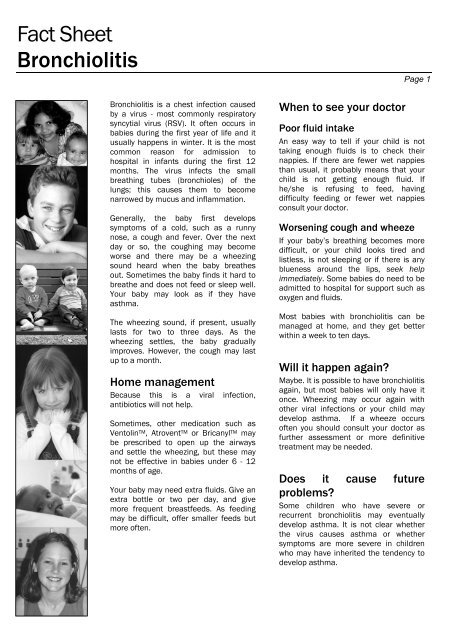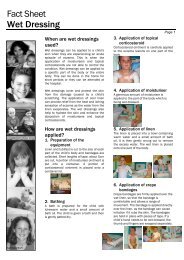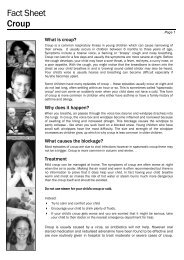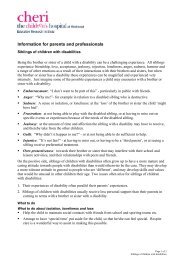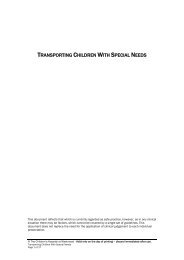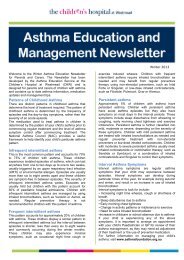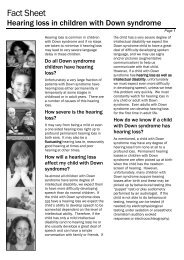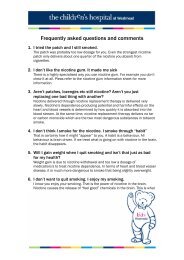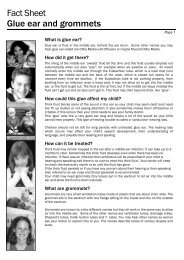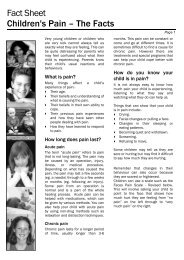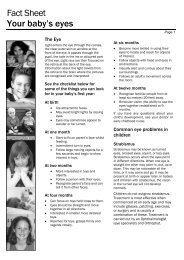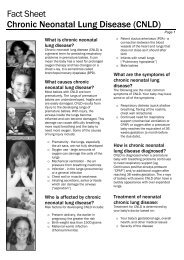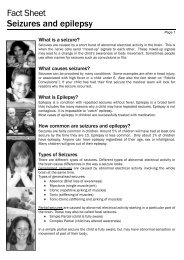Fact Sheet Bronchiolitis - Kids Health @ CHW
Fact Sheet Bronchiolitis - Kids Health @ CHW
Fact Sheet Bronchiolitis - Kids Health @ CHW
You also want an ePaper? Increase the reach of your titles
YUMPU automatically turns print PDFs into web optimized ePapers that Google loves.
<strong>Fact</strong> <strong>Sheet</strong><br />
<strong>Bronchiolitis</strong><br />
xcvxcvxcv<br />
<strong>Bronchiolitis</strong> is a chest infection caused<br />
by a virus - most commonly respiratory<br />
syncytial virus (RSV). It often occurs in<br />
babies during the first year of life and it<br />
usually happens in winter. It is the most<br />
common reason for admission to<br />
hospital in infants during the first 12<br />
months. The virus infects the small<br />
breathing tubes (bronchioles) of the<br />
lungs; this causes them to become<br />
narrowed by mucus and inflammation.<br />
Generally, the baby first develops<br />
symptoms of a cold, such as a runny<br />
nose, a cough and fever. Over the next<br />
day or so, the coughing may become<br />
worse and there may be a wheezing<br />
sound heard when the baby breathes<br />
out. Sometimes the baby finds it hard to<br />
breathe and does not feed or sleep well.<br />
Your baby may look as if they have<br />
asthma.<br />
The wheezing sound, if present, usually<br />
lasts for two to three days. As the<br />
wheezing settles, the baby gradually<br />
improves. However, the cough may last<br />
up to a month.<br />
Home management<br />
Because this is a viral infection,<br />
antibiotics will not help.<br />
Sometimes, other medication such as<br />
Ventolin TM, Atrovent TM or Bricanyl TM may<br />
be prescribed to open up the airways<br />
and settle the wheezing, but these may<br />
not be effective in babies under 6 - 12<br />
months of age.<br />
Your baby may need extra fluids. Give an<br />
extra bottle or two per day, and give<br />
more frequent breastfeeds. As feeding<br />
may be difficult, offer smaller feeds but<br />
more often.<br />
When to see your doctor<br />
Page 1<br />
Poor fluid intake<br />
An easy way to tell if your child is not<br />
taking enough fluids is to check their<br />
nappies. If there are fewer wet nappies<br />
than usual, it probably means that your<br />
child is not getting enough fluid. If<br />
he/she is refusing to feed, having<br />
difficulty feeding or fewer wet nappies<br />
consult your doctor.<br />
Worsening cough and wheeze<br />
If your baby’s breathing becomes more<br />
difficult, or your child looks tired and<br />
listless, is not sleeping or if there is any<br />
blueness around the lips, seek help<br />
immediately. Some babies do need to be<br />
admitted to hospital for support such as<br />
oxygen and fluids.<br />
Most babies with bronchiolitis can be<br />
managed at home, and they get better<br />
within a week to ten days.<br />
Will it happen again?<br />
Maybe. It is possible to have bronchiolitis<br />
again, but most babies will only have it<br />
once. Wheezing may occur again with<br />
other viral infections or your child may<br />
develop asthma. If a wheeze occurs<br />
often you should consult your doctor as<br />
further assessment or more definitive<br />
treatment may be needed.<br />
Does it cause future<br />
problems?<br />
Some children who have severe or<br />
recurrent bronchiolitis may eventually<br />
develop asthma. It is not clear whether<br />
the virus causes asthma or whether<br />
symptoms are more severe in children<br />
who may have inherited the tendency to<br />
develop asthma.
<strong>Fact</strong> <strong>Sheet</strong><br />
<strong>Bronchiolitis</strong><br />
xcvxcvxcv<br />
Remember<br />
<strong>Bronchiolitis</strong> gets better in a week to<br />
ten days.<br />
It is a viral infection, so medications,<br />
especially antibiotics, may not help.<br />
Your baby may need extra fluid, offer<br />
small frequent feeds or frequent<br />
breast feeds<br />
Consult your doctor if your child has<br />
difficulty with breathing, feeding or<br />
sleeping.<br />
Some children develop asthma after<br />
having bronchiolitis.<br />
This fact sheet is for education purposes only.<br />
Please consult with your doctor or other health professional<br />
to make sure this information is right for your child. This document was reviewed on 23 rd December 2009.<br />
www.chw.edu.au www.sch.edu.au www.kaleidoscope.org.au<br />
© The Children’s Hospital at Westmead, Sydney Children’s Hospital, Randwick & Kaleidoscope * Hunter Children’s <strong>Health</strong> Network 2009<br />
Page 2


